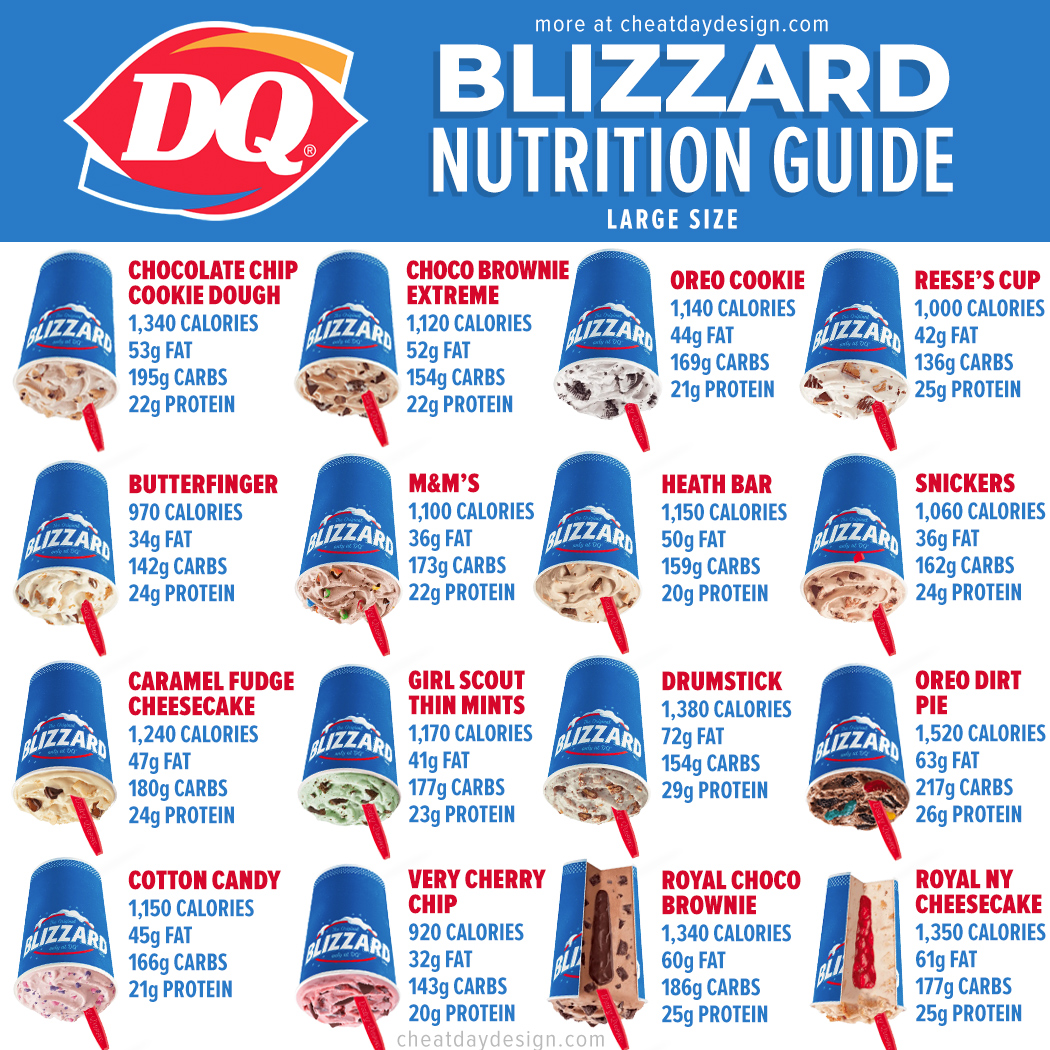When it comes to sweet treats, Dairy Queen Blizzard is a fan favorite across the globe. This delicious dessert combines soft-serve ice cream with a variety of mix-ins, creating a mouthwatering experience for every bite. However, as more people become health-conscious, understanding the nutritional information of Dairy Queen Blizzard has become increasingly important. In this article, we will delve into the Dairy Queen Blizzard nutrition info, helping you make informed choices for your diet. From calories to sugar content and everything in between, we have you covered.
With so many flavors and combinations available, it can be overwhelming to track the nutritional aspects of each Blizzard option. This article aims to simplify that process, providing a comprehensive breakdown of calories, fat, sugar, and other important nutritional facts. Whether you're indulging in a Blizzard as an occasional treat or considering it as a regular part of your diet, knowledge is key.
Additionally, we will explore healthier alternatives and tips for enjoying your favorite desserts without compromising your wellness goals. By the end of this article, you will have a clear understanding of Dairy Queen Blizzard nutrition info and how to enjoy these delightful desserts responsibly.
Table of Contents
- Introduction
- What is a Dairy Queen Blizzard?
- Nutritional Facts of Dairy Queen Blizzard
- Calories and Fat Content
- Sugar and Carb Content
- Protein and Other Nutrients
- Healthier Alternatives
- Conclusion
What is a Dairy Queen Blizzard?
The Dairy Queen Blizzard is a signature dessert that features soft-serve ice cream blended with various mix-ins, such as candies, cookies, and fruits. First introduced in 1985, the Blizzard has become a staple in many Dairy Queen locations worldwide. It is often served upside down to demonstrate its thick and creamy texture.
Varieties of Dairy Queen Blizzard
- Oreo Blizzard
- Reese's Peanut Butter Cup Blizzard
- Chocolate Chip Cookie Dough Blizzard
- Brownie Batter Blizzard
- Strawberry Blizzard
Each flavor offers a unique combination of taste and texture, making it a popular choice among ice cream lovers. But with all these delicious options comes a need to understand the nutritional implications of each one.
Nutritional Facts of Dairy Queen Blizzard
The nutritional content of Dairy Queen Blizzard varies based on the flavor and size of the dessert. Below is a general overview of its nutritional facts for a medium-sized Blizzard:
| Nutrient | Amount |
|---|---|
| Calories | 650-800 |
| Total Fat | 28-35g |
| Saturated Fat | 16-20g |
| Trans Fat | 0g |
| Cholesterol | 80-100mg |
| Sodium | 300-450mg |
| Total Carbohydrates | 85-100g |
| Dietary Fiber | 1-3g |
| Total Sugars | 60-80g |
| Protein | 12-15g |
Calories and Fat Content
Calories are a significant concern for many people when it comes to dessert. A medium Dairy Queen Blizzard can contain anywhere from 650 to 800 calories, depending on the flavor. The calorie content primarily comes from the soft-serve ice cream and the mix-ins.
In terms of fat, a typical Blizzard contains between 28 to 35 grams of total fat, with a significant portion being saturated fat. Consuming high amounts of saturated fat can contribute to various health issues, including heart disease. Therefore, it’s essential to be mindful of the fat content when enjoying a Dairy Queen Blizzard.
Sugar and Carb Content
Another essential factor to consider is the sugar content in Dairy Queen Blizzards. The average Blizzard contains between 60 to 80 grams of sugar, which can be quite high compared to daily recommended limits. The American Heart Association recommends that women limit added sugars to 6 teaspoons (25 grams) and men to 9 teaspoons (38 grams) per day.
In terms of carbohydrates, a medium Blizzard can have around 85 to 100 grams. Most of these carbohydrates come from sugars, which provide a quick source of energy but can lead to spikes in blood sugar levels.
Protein and Other Nutrients
Despite the high sugar and fat content, Dairy Queen Blizzards do contain some protein, usually around 12 to 15 grams per serving. Protein is essential for muscle repair and growth, making it a necessary nutrient in our diet.
However, Blizzards typically lack other essential nutrients like vitamins and minerals. To balance your diet, it is crucial to consume fruits, vegetables, whole grains, and lean proteins in addition to occasional treats like Blizzards.
Healthier Alternatives
If you love Dairy Queen Blizzards but are concerned about the nutritional content, there are several strategies you can employ to enjoy them in a healthier way:
- Opt for a smaller size: Choose a mini or small Blizzard to cut down on calories and sugar.
- Limit mix-ins: Select a Blizzard with fewer mix-ins to reduce overall sugar and fat.
- Share with a friend: Splitting a Blizzard can allow you to enjoy the flavor without consuming the entire dessert.
- Choose lighter options: Some Dairy Queen locations offer lighter dessert options that are lower in calories.
By being mindful of your choices, you can still indulge in a Dairy Queen Blizzard while maintaining a balanced diet.
Conclusion
In summary, understanding the Dairy Queen Blizzard nutrition info is essential for making informed dietary choices. With calorie counts ranging from 650 to 800 and high sugar and fat content, enjoying these delicious desserts requires mindfulness and moderation.
Consider healthier alternatives and be conscious of portion sizes to enjoy your favorite Blizzard without compromising your health. For those who love dessert, the key is balance. If you found this article helpful, please leave a comment or share it with your friends!
References
- Dairy Queen Official Website
- American Heart Association - Sugar Recommendations
- USDA FoodData Central
Thank you for reading! We hope to see you back on our site for more informative articles on nutrition and healthy eating.

:max_bytes(150000):strip_icc()/Fall-Blizzard-Menu-US-1-small-fb044131d68545f8bf9edc5d67d8ffa5.jpg)

